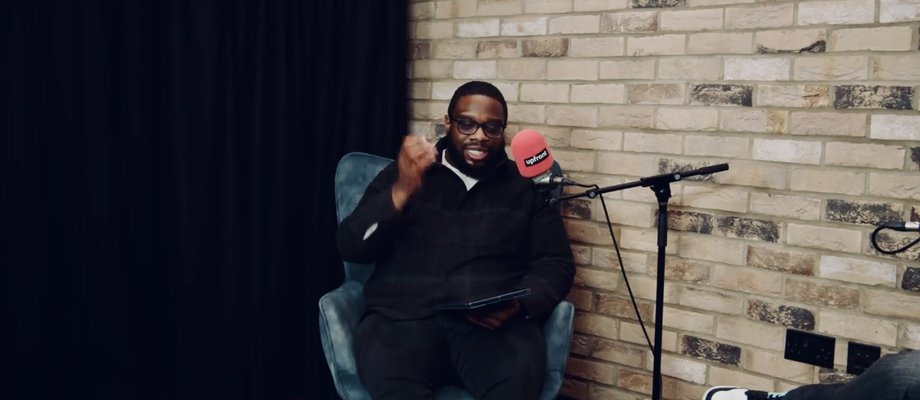In episode 7 of the new series of the Upfront podcast, financial adviser Emmanuel Asuquo chats to fintech consultant David M. Brear about why most big digital transformations fail and how you can ensure yours isn't one of them.
Here are some highlights from that conversation. Listen to the episode in full here.
Emmanuel: We're going to go straight in with the upfront question: Does digital transformation cause more problems than it solves?
David M Brear: I mean, that's a tough one. It really depends on which side of that argument you're on. I think for big organisations who are really trying to change themselves and want better service for customers and better operating costs, it solves problems rather than causing problems. But I guess with any change comes an element of disruption, and that's predominantly cultural more than anything else. Sometimes, you've got to cause problems to solve them.

Emmanuel: Why is it like every company we hear about, especially big companies, are doing this now?
David M Brear: Many of the big organizations that we work with were born in a very different age. It was analog. It was paper. It was people. It was premises, right? So moving to a digital world, most get that wrong. Most digitize themselves rather than create digital capability, which sounds like semantics, but the difference is ginormous. The difference between taking a. piece of paper and putting it on a website versus truly understanding the real virtues of digital and building something first principle up. The outcome is staggeringly different and probably a little bit less painful as well.
I'll be honest, when I heard we were going to be talking about digital transformation, I thought, this ain't gonna be that fun, but you look like someone I would go out with. You play basketball and talk with passion. It sounds exciting!
Upfront host
Emmanuel: Now, you have famously said that digital financial services are only 1 percent done. Can this really be true with all the money that's been spent and with all the apps that we have?
David M Brear: Yeah, it's a big accusation, right? Big banks in the US spend 12 or 13 billion dollars a year just keeping their technology estate alive. But really, what we mean by that is that the industry is moving so much slower than society. If you look at the advancements that we're seeing around technology change or the regulatory change that's happening all around the world, customer expectations, every industry is so much further ahead than financial services. We think we're probably being quite generous when we say 1%. Given the speed of the market, we're probably moving backwards rather than forward. This isn't necessarily, uh, Hey, guys, come on, what are you doing? It's more kind of a war cry that the 99 per cent of this journey ahead of us will be far more disruptive, impactful and far better for end consumers.
Every industry is so much further ahead than financial services. Given the speed of the market, we're probably moving backwards.
CEO 11:FS
Emmanuel: I'll be honest. When I heard we were going to talk about digital transformation, I thought, this ain't gonna be that fun, but you look like someone I would go out with on the street, look cool, play basketball, and talk with passion. It sounds exciting. Where does that come from?
David M Brear: It's not easy, don't get me wrong. Anything worth doing never is, right? The passion comes from the fact that this industry can be so much better. We always talk about the underserved, overcharged, and overwhelmed, which covers most people these days, but financial services are not getting any better to support people. It doesn't take a lot with the big incumbent organisations to make these things so much more impactful for people.
The reality is that the ability to stay relevant to customers' problems and continue to evolve is really the only sustainable differentiator in any business.
CEO 11:FS
Emmanuel: Now, you talk about digitizing the 99 percent. How are you gonna do that?
David M Brear: Yeah, well, I'd say the 99 percent will never be achieved. Successful businesses are always changing as customers' needs or the ability to service those needs fundamentally shift. So we try to get people into a mindset that culture's everything. So many organizations get into a mindset of "Well, there's some sort of technological solution we can procure that solves all of our problems." Like blockchain's a panacea, it will fix all these things, AI, or whatever. But the reality is that the ability to stay relevant to customers' problems and continue to evolve is really the only sustainable differentiator in any business.
Emmanuel: Talk to me about why some digital transformation projects fail?
David M Brear:. Yeah. We’ve seen people spend billions of pounds and write off those transformations because they couldn't make that change stick within the organizations or they've built a thing that they can't do anything with. It's like an organ transplant. You've got to make sure that the host is able to keep the organ rather than just chucking it in and hoping it works out. I'd say most big transformations fail. A lady on the board of a UK bank took me aside after I gave a presentation to them. She said, our problem is, we are a caterpillar and we keep going into a chrysalis and dreaming of this butterfly, but we come out a caterpillar again. And, that's the issue. People do all the work they think is right, but the process is geared up for large-scale transformation. It's two or three years. It's a horizon that never really comes. The most important thing in a digital business is that if you find out something's wrong, you fix it really quickly, right? It's the speed of change. Very often, the fintechs have done the work before the incumbent can schedule the meeting to talk about the work. Even from a cultural perspective, nobody wants to work on something for three years and maybe never see it happen.
It's like organ transplant. You've got to make sure the host is able to keep the organ, rather than just chucking it in and hoping it works out ok.
CEO 11:FS
Emmanuel: Can you talk to us about some of the more impressive transformations you've done and why they were good?

David M Brear: We're doing some really interesting work now, looking at the complexities of ultra-high net worth. I mean, nobody's going to cry themselves to sleep that they're underserved, but it's much more akin to a medium sized corporate than it is a retail account. We all say financial is a service, and the bit mostly missing from the industry is somebody to solve those problems for you. If you think of Rihanna's banking experience, she's got six people looking after her finances and moving money around like a treasury function to make it work. People don't have that, but actually, that's the type of service we could be building for people. We think the future is essentially self-driving money. Financial services is a funny industry. They have all of the expertise, but then they typically will get you to pick from a list of things which one you think is the right one, and that doesn't make a great deal of sense to me. It's like your surgeon asking you where to cut. So, the advice side of things, I think, will dramatically increase, but being able to use algorithms to help people maximize their money is really where we think the future will go.
Emmanuel: I love that. Like how, growing up, you wish you had a driver and now we have Uber. So even if you can't afford a driver and a nice car, you can have Uber and get that similar service. I totally see your vision.
David M Brear: We use that as a metaphor because it's a chauffeur for the mass market, right? Airbnb is like the second home, Deliveroo is the private chef, right? So that continuation, it's like a private banker for the mass market. That's where we should be aiming. Most people don't know what a good financial system looks like, how much they should save, whether they should pay off debt or save some money. All of these complexities are where organisations have the expertise to help people with that stuff. That's what I think they should be doing.
Most people don't know what a good financial system looks like.
CEO 11:FS
Emmanuel: What advice do you have for our listeners who are trying to implement digital transformation programs? How can they make them a success?
David M Brear: I always say attitude and effort are everything. Those two things are fundamentally in your control. So, for me, how do you make something successful? Fundamentally, it's just a habit. Do those two things every day, and good things seem to happen.
Listen to this episode here
Meet our guest
David M. Brear
David is the CEO of fintech consultancy 11:FS. Since his dream of being a sportsperson was crushed (along with the ligaments in his knee), and he had to get a proper job, he has worked in pretty much every angle of the financial services industry but has never lost that competitive desire to win.
Having pitched, established, and run billion-pound transformations for some of the biggest FS companies on the planet, the realisation that digital banking is only 1% finished has spurred his desire to establish an organisation that can actually make it happen.
Most recently, David, as its CEO, led the creation and market establishment of the challenger business bank Mettle for Natwest in the UK, proving that big banks can fight back against the fintech threat.
Loved this?
Then listen up
Upfront is the award-winning podcast for the financial services industry brought to you by Iress. Series 3 is out now, featuring 10 brand new episodes and conversations that everyone working in financial services needs to hear. Listen to Upfront on your favourite podcast app and follow so you never miss an episode.





